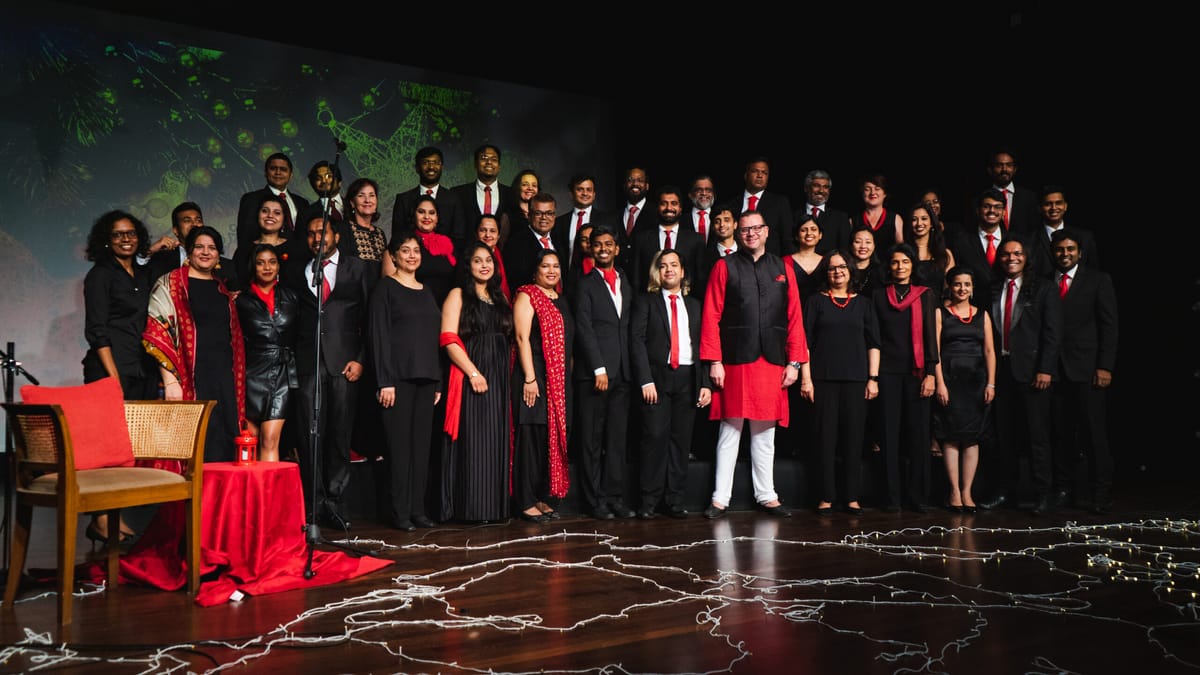The Art of Conducting a Choir: Balancing Repertoire, Technique, and Social Dynamics

Three thousand nine hundred and twenty. That is approximately the number of hours I have spent in choir rehearsals since I started singing in the Gothenburg Cathedral Boys’ Choir at the age of 11. On top of that come concerts, performances, camps, tours, recordings, exams and various other things related to everything that is a choir. Combined with studies in musicology at the University of Gothenburg and years of vocal studies, this experience gives me fairly solid ground to stand on when it comes to potentially leading a choir.
Nevertheless, every time someone proposed the idea, my response was always a solid no. To my mind, it was unthinkable that I should do what “my” choir conductors do—people whom I admire and respect greatly. I could never envision myself being able to control a united force of 40 singers and lead them through their musical journey and take responsibility for their vocal development and evolution. Still, here I am, heading two choirs: Cappella Bangalore, formed in 2019, now with 24 ladies and The Bangalore Men, soon to turn seven years, with 20 tenors and basses. This is the story of my own journey as a choir conductor, but it is also the story of two choirs that started off as a weekend activity and now do over 15 performances every year singing music spanning eight centuries.
In 2015, I had the opportunity to become associated with The Bangalore School of Music. I had been working and residing in India since 2006 and had performed with various choirs and also done quite a few recitals on my own. However, being brought up in the Swedish choral tradition, I had started to feel that I was missing the Scandinavian sound and ways of working in the choir setting. I started toying with the idea of launching a choir, but quickly pushed it aside for reasons stated above. However, my Swedish vocal coach and dear friend persistently kept nudging me to nurture the idea and to try it out. Late in 2015, I contacted a few of my fellow singer colleagues from various choirs and checked whether they would be interested to join a project and do a concert or two. Since my choral education had mainly been in the boys’ choir (and later the male choir)—a genre that was close to my heart—I decided to try to do something with this slightly more unusual ‘instrument’, and in February 2016, seven singers met for the first rehearsal of what was to become The Bangalore Men.
Our first concert was “A Cappella through the Ages” which we had the opportunity to, in a short period, perform in both Bengaluru and Puducherry. The repertoire for our first concert series was mainly centred around medieval to Renaissance and early Baroque works. Music that isn’t that easy to perform well, to be honest, and requires a high level of precision, control and musical maturity. In retrospect, I do have to say, some of the choices for the programme weren’t the best ones. That concert taught me the first lesson I have carried with me since: when working with choirs, choose repertoire wisely.
When working with a choir as a conductor, we need to view it as our instrument—an instrument that we have the responsibility to “play” at its best. The repertoire choice is imperative. I often work with “effective” music, which isn’t overly challenging, but is both singable for the choir as well as pleasing to the ear for the audience. Combining this with a few more difficult pieces for a concert programme makes it possible for both us and the audience to learn and grow. Understanding the complexity of repertoire from different eras is a must for a choir conductor because that helps create a base repertoire that can then be reused and topped off with musical cherries of various kinds.
And what do we then need to do for a concert once we have found our suitable repertoire? Well, it all starts with a vocal and musical foundation. Imagine you are building a house. You don’t quite start with hanging pictures or choosing wallpaper before the foundation is secured. The same goes for a choir. If we don’t spend ample amount on the foundation, which for us is vocal technique, music theory and music history, we might be able to pull off some concerts, but the learning process is slow and eventually we will come to a level from which we cannot proceed further. Don’t skimp on the basics is my simple advice. Music theory and music history can easily be made part of every rehearsal in a fun way. Stay innovative in the learning process, maybe through online quizzes, guest speakers, workshops, games, anecdotes and storytelling. Making the singers take responsibility for their own learning makes them the best students.
And ah, yes, the students or the singers as they are. This brings us to our third and final aspect—the choir as a social context. Why do people sing? What motivates them? A choir is such an interesting social microcosm, and it is our responsibility as conductors to recognise that, in order to make every singer the best version of her- or himself. Don’t get me wrong. A choir is still a collective effort, but that doesn’t mean every singer has a need to be seen (and heard). How can this be done? Well, I try to have individual chats with my singers at the start of the year, to understand how they feel about singing with us, any challenges they have and to give feedback to me as conductor. Another way is to work with small individual assignments (not necessarily always of the vocal kind). Someone might be great at designing posters or is great at logistics for tours, or makes for a good compère at a concert. Think out of the box, to make sure every singer finds their place in the whole and feels treated with respect and dignity.
Our journey with The Bangalore Men and Cappella Bangalore over the years has broadly been based on these three principles, even if the life of working with choirs is of course more complex and interesting and fun than can be summarised in a brief article. My concluding words are another attempt at encapsulating this experience—music shall be built from joy; from joy we build music!
By Jonas Olsson. This piece was originally published by the National Centre for the Performing Arts, Mumbai, in the January 2023 issue of ON Stage – their monthly arts magazine.





